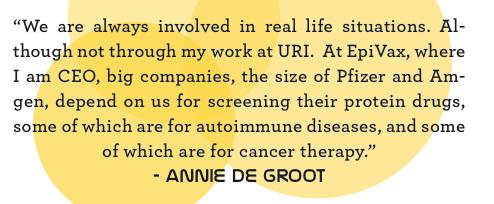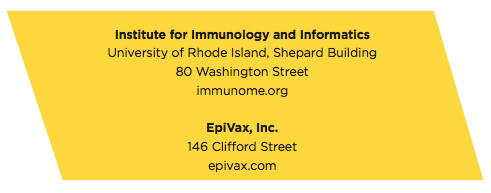Would you believe it if I told you that there is a company that could develop a vaccine for Ebola in 120 days? Well, the science of today is the technology of tomorrow, and this is true of the work done by Providence-based Annie de Groot, a vaccinologist and entrepreneur. She is the CEO/CSO of EpiVax, Inc, a vaccine design company she co-founded in 1998. She is also a research professor at the University of Rhode Island and director of the Institute for Immunology and Informatics (iCubed), which she founded in 2008 as part of the university’s emerging biotechnology program, located at URI CCE in the Shephard Building. Throughout her career she’s been recognized on the national, international and local level including just this past September, when VaccineNation named her one of the Top 50 Most Influential People.
But what inspires a person to work in the field of vaccinology? For Annie, it was when she witnessed what was available to those who could pay for health care and those who could not – the consequences were often lethal. “Once the disparities became clear to me, there was no turning back,” she says. “As a medical student, I rotated through hospitals in Zaire, South Africa and Peru. Those experiences are indelibly etched into my memory. In those far- flung places, I was witness to deaths from vaccine-preventable disease. Who was dying? Children. Their mothers mourned them. But to the outside world, they were just a number, a statistic, another death from measles that did not need to occur.”
It is from those experiences that solidified her knowledge that vaccines are life-saving and that access to health care is a human right. She firmly believes that right should not be limited by geography or circumstances of birth. “I am driven to improve access to health care and to vaccines, everywhere in the world,” emotes Annie.URI has become a leader in the field of vaccine discovery since the addition of iCubed in 2008. The focus of iCubed is to apply cutting-edge bioinformatic tools to accelerate the development of treatments and cures for a number of diseases. The tool she uses is the iVAX toolkit, which was initially developed by her biotech company, EpiVax, Inc. These tools can be used with many diseases. Currently, in the lab and with collaborators, some diseases she is working on include Dengue, avian influenza and Lyme. This tool has also been made available to collaborators in cancer vaccines and she is beginning a project on transplant rejection, which may also be predictable using the iVAX toolkit.

And like many other Rhode Islanders, this writer has had Lyme disease and still struggles with its side effects. Lucky for us, she is collaborating with URI’s “Tick Guy” Tom Mather on a project that may lead to a vaccine against Lyme disease. If you are unfamiliar, Lyme is caused by a bacterium contained in the saliva of a deer tick. When a tick pierces the skin, its saliva is injected into the host, and the bacterium with it. It takes an infected deer tick 36- 48 hours to transmit Lyme disease once you are bitten. Tom and his associate Wendy Coy Shattuck have identified a way of using the tick’s saliva to make a vaccine against the tick’s saliva. In other words, by having immunity to the tick’s saliva, anything that the tick injects along with the saliva will not be able to infect you. This type of vaccine approach has implications for other tick-borne pathogens.
It is this ability to discover new things with the iVAX toolkit that Annie finds so fascinating. “Hav- ing access to so much genomic information, which wasn’t really even available to this extent ten years ago, is amazing,” she beams. “We can scan microbe genomes, we can scan parasite genomes and we can scan the human genome for triggers that drive immune response. In doing so, we are able to find [the] sequence in those genomes that turn the immune response off and on. Turning immune response on is important for vaccines and turning them off is important for autoimmune disease.”
“Because I know that access to vaccines can be lifesaving, I find the work that we do at EpiVax and iCubed to be passionately interesting,” she says.“When I worked with the measles vaccination campaign in Zaire and in South Africa, I learned about the power of vaccination against disease. Now I have the opportunity (with my colleagues at EpiVax) to research and develop an AIDS vaccine and vaccines against Hepatitis C, influenza, TB and, yes, Ebola too.”
She believes that a vaccine is truly the only hope to stop Ebola in West Africa, seeing as vaccinations are so effective especially in rural African vil- lages where developing world medicine hasn’t extended its reach. For Annie, “when addressing health inequality, rather than focusing on the reason why the inequity exists, I do not ask why it came to be–but why not make it change.” In true form, Annie’s company EpiVax has already analyzed the Ebola vaccine. The results of that analysis are available to the research world on the EpiVax website.
And the reason there isn’t an Ebola vaccine yet? Well, it’s all about the lack of available funding in vaccine development. Despite proving that she and her colleagues can produce a vaccine in 120 days, and despite the fact that EpiVax has already analyzed Ebola, Annie’s offer goes unanswered. Unless the funding becomes available, they cannot do their work.
In true form, Annie is just as passionate about this issue as ever: “I would like to thank Ebola for uncovering the dramatic inequities in health care in the developing world, and for revealing to the world how important vaccines can be.”

Comments
No comments on this item Please log in to comment by clicking here